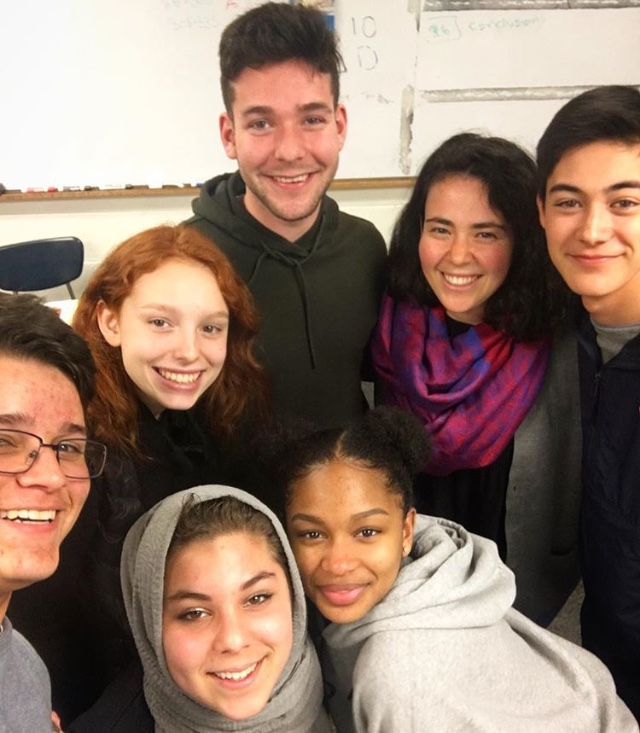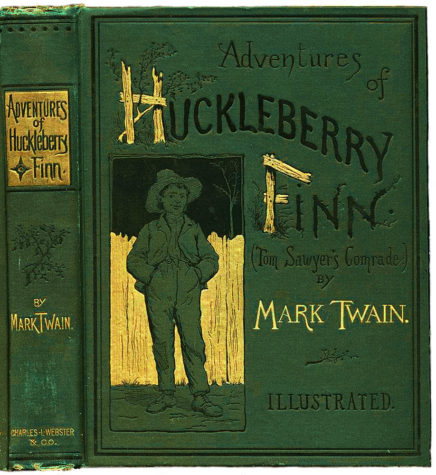The Truth About Why Miriam is Leaving
May 21, 2018
Miriam Rock recently announced her departure after three years of teaching at SSFS. We sat down with her to discuss her future plans, pedagogy and her next school, Friends Select.
For those who don’t know, Why are you leaving SSFS?
I grew up and went to school in Philadelphia. After college, I came back to do my masters at Penn Graduate School of Education. I student taught and lived in Philly. I think for me, living in Philly as a child and as an adult cemented it as my home.
When I finished grad school, I knew I had very specific ideas about the type of school I wanted to teach at, students I wanted to teach and faculty I wanted to work with. I had this moment in my life where I realized that I had the freedom to go anywhere because I was young, unattached and mobile. Teaching Upper School English at SSFS was the job I was most excited by and I have absolutely no regrets coming here. It’s a really wonderful institution and has been an amazing place to start my career.
Throughout the last three years, even as I’ve grown to love my life in Maryland, Philly has continued to feel like home. Every time I drive up to Philly and I see the skyline, it feels like my heart clicks into place. This feels like a sign. So, I applied very selectively to jobs in Philly, not because I wanted to leave SSFS but because I wanted the opportunity to go home.
What initially made you come to SSFS?
The student body is amazing- the level of enthusiasm with which the student body approaches academics and extracurriculars is really special. The number of authentically student run organizations suggests a level of agency in a student body that is rare.
Additionally, I’m a progressive educator and truly believe in child centered education. I think SSFS both supports progressive education and gives teachers real autonomy in their classroom to enact this education as they see fit. The students and administration at SSFS are receptive to what and how I want to teach.
There are obviously a lot of similarities going from one Quaker school to the next, how is the school your teaching at next year different to SSFS?
So, I think I want to start with the similarities. Friend Select is also a progressive Quaker school. It’s a school that supports students but wants to push them to be the best versions of themselves. It’s a small school, I’m teaching tenth and 11th graders, and I’m teaching similar things.
I think the biggest difference is the location. The opportunity to use Sandy Spring’s 160 acre campus shapes the way you teach. Last year, I taught The Last Runaway by Tracy Chevalier which is a book about a Quaker getting involved in the Underground Railroad. As part of a lesson, I took my students on the underground railroad trail in our backyard. Our school has that opportunity because of its proximity to nature.
Friends Select is in the middle of Philadelphia and it’s very much an urban school. I’m extremely passionate about teaching issues of race, gender, nationality and mental health and when you’re in a city those issues abut each other much more intensity. For me, it’s going to be an amazing opportunity to teach at a school where I’ll be able to use the city as my classroom.
What made you choose Friends Select aside from its location?
During my student teaching, I experienced working as a progressive educator in a school that wasn’t particularly progressive. When I came to SSFS and it was a lot more progressive, it became clear to me that there’s real power in your vision as an education aligning with the institution’s. I think Friends Select does progressive education well and so that was a big draw. During my interview, I connected with their students and could see myself building the types of relationships I’ve built at SSFS with Friends Select students.
Tell us about your new job!
I’m teaching the entire 10th grade English which will be British literature. I’m taking my AP British literature course and combining it with the Brit Lit course they have. I’m really excited to be able to teach the whole 10th grade because you just get a sense of a class if you teach all of them. I’m also teaching one of three sections of American Lit. I’ve loved working with Ariel on the English 10 curriculum and am really looking forward to collaborating with a member of my new department. It’s fun to bounce ideas off of each other and check in on what does and doesn’t work. Two teachers are often better than one.
If you could impart any advice to future (and current!) Wildezine writers about creating a successful newspaper, what would it be?
You have to find your story. One of the reasons why we’ve been so successful these past couple of years is because we stopped talking about the lunch room and started talking about the things that matter. We’ve started looking for the hooks and angles.
Being a high school student is a really hard place to be; in many ways society doesn’t let you have power over your own life. Writing articles is a way to fight for that power and make your voice heard. The administration reads what we write. There’s a real difference between grumbling about something with your friends and writing something that influences a conversation at this school. What’s so powerful about writing is, because you put your idea down and have the opportunity to revise it, you often get to say the best formulated version of your idea. This version is the one that is most likely to make people stop, think, evaluate and, perhaps, reorient. My advice would be look for the story and, when you find it, don’t hesitate.
Finally, we have incredibly thoughtful and skilled editors and it’s in the writer’s best interest to leverage their resources. I don’t know of a good writer who doesn’t edit or get others to help them edit. Good pieces of writing are never the product of just one person. Leverage the power of the editorial perspective so that the final product is our collective best work.
On a larger scale, do you have any final words for SSFS students?
I’ve been a student a fair number of times and when you think about learning you’re thinking about it on three levels: as an individual, with your peers and from and with mentors. When I think back on my educational experiences, one of the things that I’m most proud of is the way I stayed in touch with my mentors. Because your mentors have seen you grow, they’re invested in you for the rest of their lives. Mentors want you to succeed.
In the past, I have fallen prey to feeling awkward or not known how to keep in touch with mentors. My biggest advice would be for SSFS students to not fall into that trap. Believe me when I say that I want to stay in touch. I want to hear from you, take you out for lunch, treat you to coffee. I care about every single student who has touched my life. When I say call me if you’re ever in Philly, I actually mean it.







